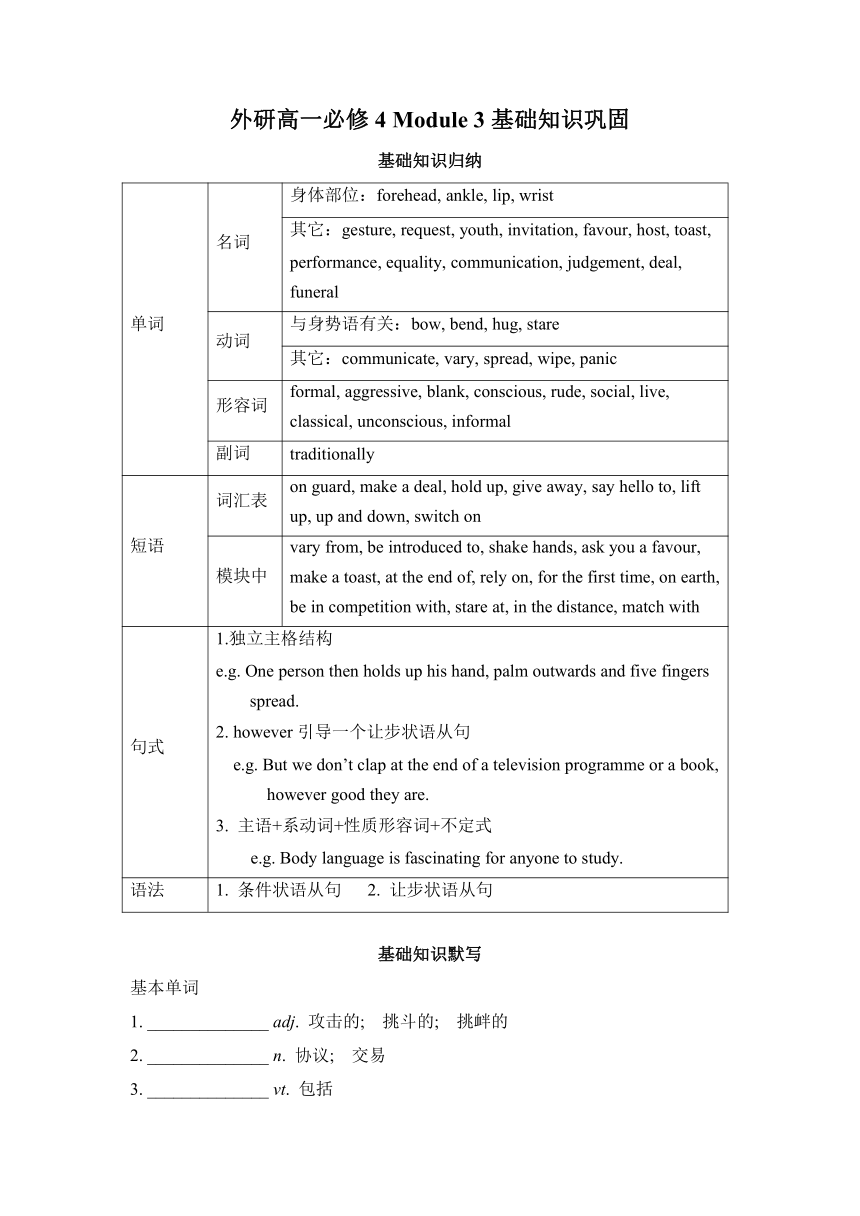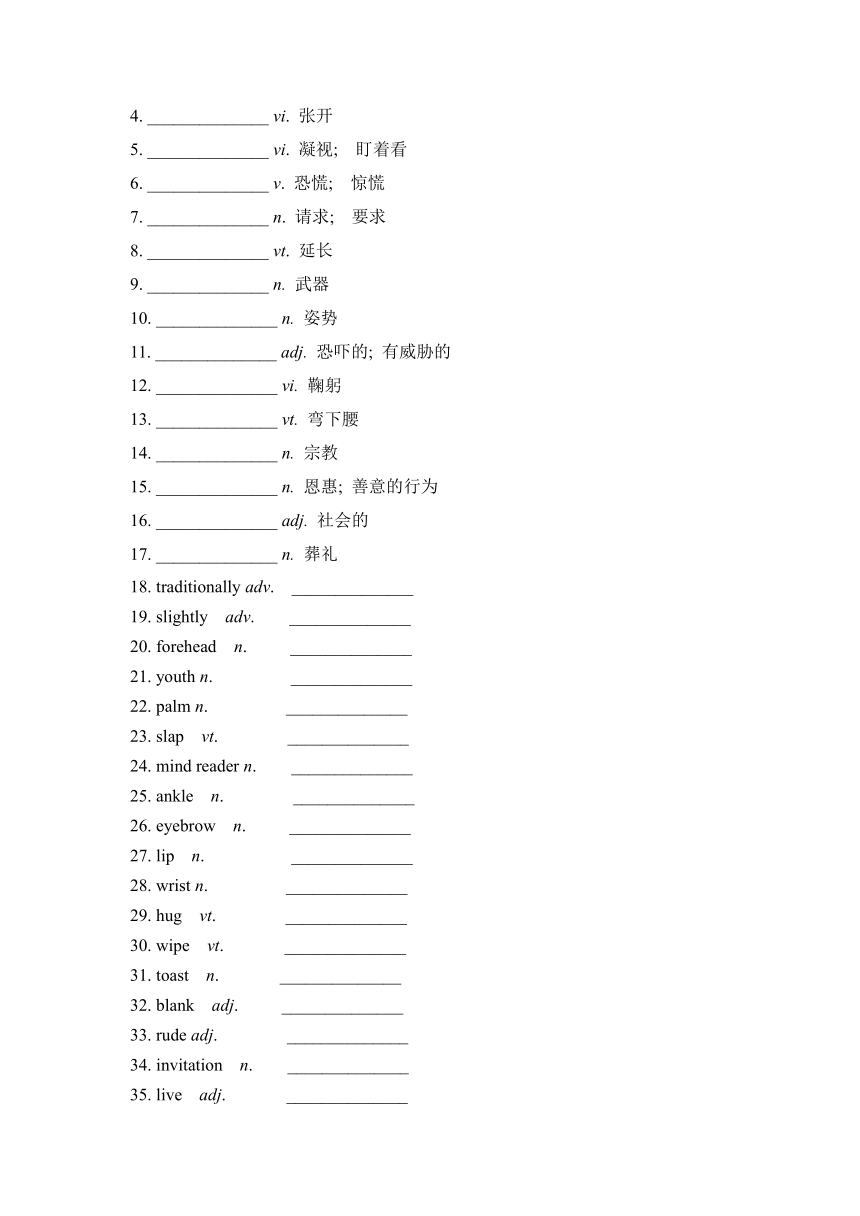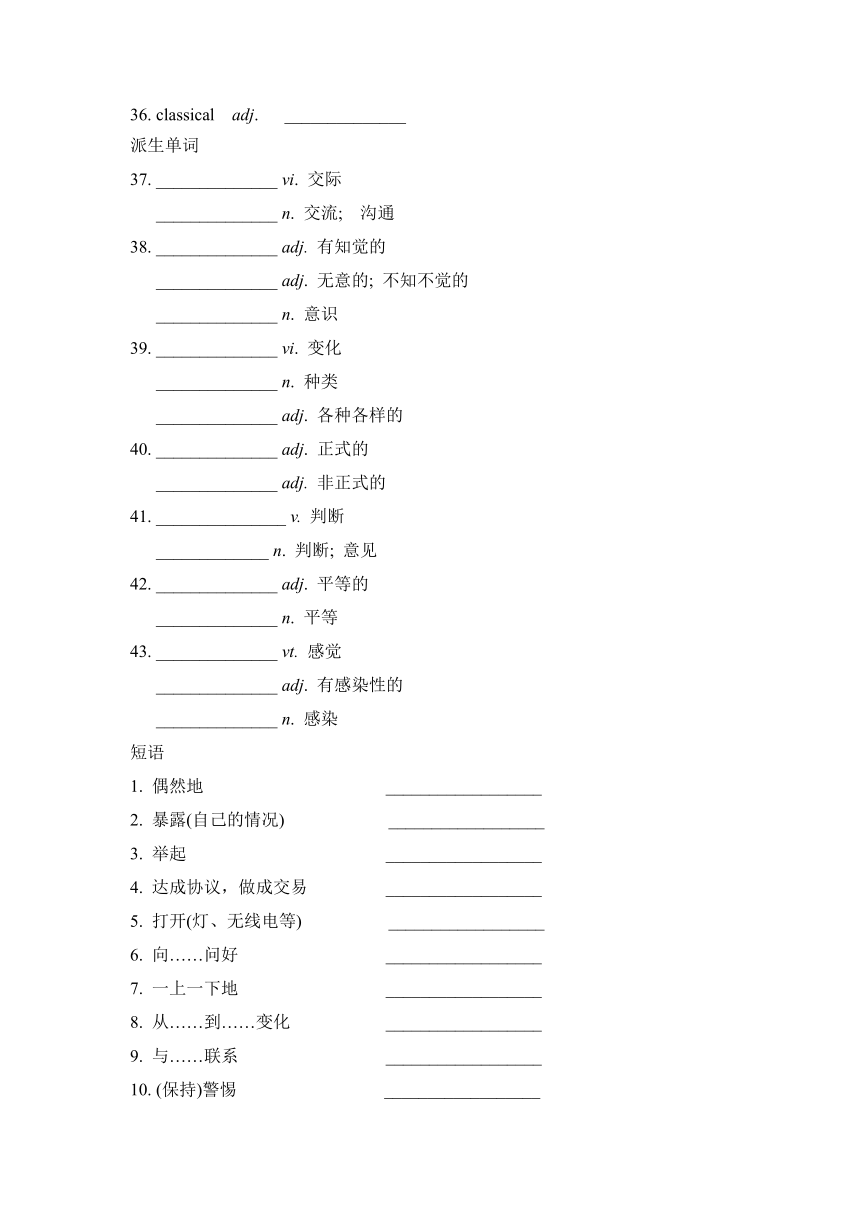外研版必修四 Module3 Body Language and Non-Verbal Communication 基础知识巩固练习(含答案)
文档属性
| 名称 | 外研版必修四 Module3 Body Language and Non-Verbal Communication 基础知识巩固练习(含答案) |

|
|
| 格式 | docx | ||
| 文件大小 | 20.4KB | ||
| 资源类型 | 教案 | ||
| 版本资源 | 外研版 | ||
| 科目 | 英语 | ||
| 更新时间 | 2022-03-07 00:00:00 | ||
图片预览



文档简介
外研高一必修4 Module 3基础知识巩固
基础知识归纳
单词 名词 身体部位:forehead, ankle, lip, wrist
其它:gesture, request, youth, invitation, favour, host, toast, performance, equality, communication, judgement, deal, funeral
动词 与身势语有关:bow, bend, hug, stare
其它:communicate, vary, spread, wipe, panic
形容词 formal, aggressive, blank, conscious, rude, social, live, classical, unconscious, informal
副词 traditionally
短语 词汇表 on guard, make a deal, hold up, give away, say hello to, lift up, up and down, switch on
模块中 vary from, be introduced to, shake hands, ask you a favour, make a toast, at the end of, rely on, for the first time, on earth, be in competition with, stare at, in the distance, match with
句式 1.独立主格结构 e.g. One person then holds up his hand, palm outwards and five fingers spread. 2. however引导一个让步状语从句 e.g. But we don’t clap at the end of a television programme or a book, however good they are. 3. 主语+系动词+性质形容词+不定式 e.g. Body language is fascinating for anyone to study.
语法 1. 条件状语从句 2. 让步状语从句
基础知识默写
基本单词
1. ______________ adj. 攻击的; 挑斗的; 挑衅的
2. ______________ n. 协议; 交易
3. ______________ vt. 包括
4. ______________ vi. 张开
5. ______________ vi. 凝视; 盯着看
6. ______________ v. 恐慌; 惊慌
7. ______________ n. 请求; 要求
8. ______________ vt. 延长
9. ______________ n. 武器
10. ______________ n. 姿势
11. ______________ adj. 恐吓的; 有威胁的
12. ______________ vi. 鞠躬
13. ______________ vt. 弯下腰
14. ______________ n. 宗教
15. ______________ n. 恩惠; 善意的行为
16. ______________ adj. 社会的
17. ______________ n. 葬礼
18. traditionally adv. ______________
19. slightly adv. ______________
20. forehead n. ______________
21. youth n. ______________
22. palm n. ______________
23. slap vt. ______________
24. mind reader n. ______________
25. ankle n. ______________
26. eyebrow n. ______________
27. lip n. ______________
28. wrist n. ______________
29. hug vt. ______________
30. wipe vt. ______________
31. toast n. ______________
32. blank adj. ______________
33. rude adj. ______________
34. invitation n. ______________
35. live adj. ______________
36. classical adj. ______________
派生单词
37. ______________ vi. 交际
______________ n. 交流; 沟通
38. ______________ adj. 有知觉的
______________ adj. 无意的; 不知不觉的
______________ n. 意识
39. ______________ vi. 变化
______________ n. 种类
______________ adj. 各种各样的
40. ______________ adj. 正式的
______________ adj. 非正式的
41. _______________ v. 判断
_____________ n. 判断; 意见
42. ______________ adj. 平等的
______________ n. 平等
43. ______________ vt. 感觉
______________ adj. 有感染性的
______________ n. 感染
短语
1. 偶然地 __________________
2. 暴露(自己的情况) __________________
3. 举起 __________________
4. 达成协议,做成交易 __________________
5. 打开(灯、无线电等) __________________
6. 向……问好 __________________
7. 一上一下地 __________________
8. 从……到……变化 __________________
9. 与……联系 __________________
10. (保持)警惕 __________________
句型
1. 独立主格结构
e.g. One person then holds up his hand, palm outwards and five fingers spread.
2. however引导一个让步状语从句
e.g. But we don’t clap at the end of a television programme or a book, however good they are.
3. 主语+系动词+性质形容词+不定式
e.g. Body language is fascinating for anyone to study.
基础知识运用
基础训练篇
I. 选用方框内合适的单词并用其正确形式填空(每个单词限用一次)。
involve, formal, hug, weapon, rude, gesture, spread, bend, vary, request
1. Anderson repeated his ________ that the meeting should be put off.
2. They ________ each other when they met at the station after many years.
3. There were some coins lying on the floor. I ________ down and picked them up.
4. You won’t last long in your job if you carry on being so ________ to the customers.
5. The fire ________ very rapidly because of the strong wind, causing great damage.
6. Drivers need to take note of the weather conditions and ________ their speed accordingly.
7. Since they spoke only Japanese, we used signs and ________ to make ourselves understood.
8. You shouldn’t use “Yours faithfully” — it’s much too ________ for this kind of letter.
9. The suspects were finally persuaded to come out and hand over their ________ to the police.
10. The job Mary has applied for ________ working with a software development team.
II. 根据括号内的汉语提示补全下面句子(每空一词)。
1. The police warned people to be ________ ________ ( 警惕) for thieves during the Christmas rush.
2. It was going to cost me a fortune to get my car fixed, but I ________ ________ ________ (达成协议) with the mechanic to lower the price since I had been a loyal customer for so long.
3. I thought no one knew where I was, but my loud breathing ________ ________ ________ (暴露了我).
4. The twin sisters were jumping ________ ________ ________ (一上一下地) on the sofa and screaming excitedly.
5. It was known that many great scientific discoveries happened entirely ________ ________ (偶然地).
6. I haven’t seen Jerry for weeks. Please ________ ________ ________ ________ (向他问好) for me when you get there!
III. 选用方框内合适的词补全下面句子(每个单词限用一次)。
whoever, wherever, whenever, however, whatever
1. It is generally considered unwise to give a child ________ he or she wants.
2. ________ serious a problem you may have, you should gather your courage to face the challenge.
3. Please call my secretary to arrange a meeting this afternoon, or ________ it is convenient to you.
4. In peace too, the Red Cross is expected to send help ________ there is human suffering.
5. Sarah hopes to become a friend of ________ shares her interests.
能力提升篇
阅读下面短文,在空白处填入1个适当的单词或括号内单词的正确形式。
It is said that more than 93% of all communication is non-verbal. Given the effort we put into 1. _______ (choose) our words (i.e., our verbal communication), can this statistic really be accurate
A study 2. _______ (conduct) by Mehrabian and Wiener in 1967. In their experiment, researchers read participants a list of words in a neutral, negative, or positive tone and showed photos of 3. _______ variety of matching or incongruent (不一致的) facial expressions.
Judging by the sound of the words and emotions 4. _______ (show) in the photos, they asked participants to identify the intention behind the words. They found that only 7% of the 5. _______(judge) was based on the actual words, 38% was based on tones, and 55% was based on facial expressions (i.e., a total of 93%). From this study we could see participants largely ignored the words. However, they kept their concentration on paralinguistic signals.
Does this mean non-verbal communication carries 6. _______ (much) weight than verbal communication The answer depends 7. _______ whether we perceive people’s words as matching their intentions. As study co-author Albert Mehrabian later wrote, “When someone’s words seem 8. _______ (match) their non-verbal signals, we’ll 9. _______ (possible) fully focus on the words. It’s only when we see that someone’s words don’t match their non-verbal signals 10. _______ we pay attention to non-verbal communication.”
参考答案:
基础知识默写
基本单词
1. aggressive 2. deal 3. involve 4. spread 5. stare 6. panic 7. request
8. prolong 9. weapon 10. gesture 11. threatening 12. bow 13. bend
14. religion 15. favor 16. social 17. funeral
18. 传统地 19. 轻微地;稍微 20. 前额 21. 年轻人 22. 手掌
23. 掌击 24. (自称或被认为)能看透别人心思的人 25. 脚踝
26. 眉毛 27. 嘴唇 28. 手腕 29. 紧抱;拥抱 30. 擦;抹;揩
31. 祝酒;干杯 32. 空白的 33. 粗鲁的;无礼的 34. 邀请
35. 现场的 36. 古典的;古代的
派生单词
municate communication 38. conscious unconscious consciousness
39. vary variety various 40. formal informal 41. judge judgement
42. equal equality 43. infect infectious infection
短语
1. by accident 2. give away 3. hold up/ lift up 4. make a deal
5. switch on 6. say hello to 7. up and down 8. vary from… to…
9. communicate with 10. on guard
基础知识运用
基础训练篇
I. 1. request 2. hugged 3. bent
4. rude 5. spread 6. vary
7. gestures 8. formal 9. weapons
10. involves
II. 1. on guard 2. made a deal 3. gave me away 4. up and down
5. by accident 6. say hello to him
III. 1. whatever 2. However 3. whenever 4. wherever
5. whoever
能力提升篇
1. choosing 2. was conducted 3. a 4. shown
5. judgement 6. more 7. on / upon 8. to match
9. possibly 10. that
基础知识归纳
单词 名词 身体部位:forehead, ankle, lip, wrist
其它:gesture, request, youth, invitation, favour, host, toast, performance, equality, communication, judgement, deal, funeral
动词 与身势语有关:bow, bend, hug, stare
其它:communicate, vary, spread, wipe, panic
形容词 formal, aggressive, blank, conscious, rude, social, live, classical, unconscious, informal
副词 traditionally
短语 词汇表 on guard, make a deal, hold up, give away, say hello to, lift up, up and down, switch on
模块中 vary from, be introduced to, shake hands, ask you a favour, make a toast, at the end of, rely on, for the first time, on earth, be in competition with, stare at, in the distance, match with
句式 1.独立主格结构 e.g. One person then holds up his hand, palm outwards and five fingers spread. 2. however引导一个让步状语从句 e.g. But we don’t clap at the end of a television programme or a book, however good they are. 3. 主语+系动词+性质形容词+不定式 e.g. Body language is fascinating for anyone to study.
语法 1. 条件状语从句 2. 让步状语从句
基础知识默写
基本单词
1. ______________ adj. 攻击的; 挑斗的; 挑衅的
2. ______________ n. 协议; 交易
3. ______________ vt. 包括
4. ______________ vi. 张开
5. ______________ vi. 凝视; 盯着看
6. ______________ v. 恐慌; 惊慌
7. ______________ n. 请求; 要求
8. ______________ vt. 延长
9. ______________ n. 武器
10. ______________ n. 姿势
11. ______________ adj. 恐吓的; 有威胁的
12. ______________ vi. 鞠躬
13. ______________ vt. 弯下腰
14. ______________ n. 宗教
15. ______________ n. 恩惠; 善意的行为
16. ______________ adj. 社会的
17. ______________ n. 葬礼
18. traditionally adv. ______________
19. slightly adv. ______________
20. forehead n. ______________
21. youth n. ______________
22. palm n. ______________
23. slap vt. ______________
24. mind reader n. ______________
25. ankle n. ______________
26. eyebrow n. ______________
27. lip n. ______________
28. wrist n. ______________
29. hug vt. ______________
30. wipe vt. ______________
31. toast n. ______________
32. blank adj. ______________
33. rude adj. ______________
34. invitation n. ______________
35. live adj. ______________
36. classical adj. ______________
派生单词
37. ______________ vi. 交际
______________ n. 交流; 沟通
38. ______________ adj. 有知觉的
______________ adj. 无意的; 不知不觉的
______________ n. 意识
39. ______________ vi. 变化
______________ n. 种类
______________ adj. 各种各样的
40. ______________ adj. 正式的
______________ adj. 非正式的
41. _______________ v. 判断
_____________ n. 判断; 意见
42. ______________ adj. 平等的
______________ n. 平等
43. ______________ vt. 感觉
______________ adj. 有感染性的
______________ n. 感染
短语
1. 偶然地 __________________
2. 暴露(自己的情况) __________________
3. 举起 __________________
4. 达成协议,做成交易 __________________
5. 打开(灯、无线电等) __________________
6. 向……问好 __________________
7. 一上一下地 __________________
8. 从……到……变化 __________________
9. 与……联系 __________________
10. (保持)警惕 __________________
句型
1. 独立主格结构
e.g. One person then holds up his hand, palm outwards and five fingers spread.
2. however引导一个让步状语从句
e.g. But we don’t clap at the end of a television programme or a book, however good they are.
3. 主语+系动词+性质形容词+不定式
e.g. Body language is fascinating for anyone to study.
基础知识运用
基础训练篇
I. 选用方框内合适的单词并用其正确形式填空(每个单词限用一次)。
involve, formal, hug, weapon, rude, gesture, spread, bend, vary, request
1. Anderson repeated his ________ that the meeting should be put off.
2. They ________ each other when they met at the station after many years.
3. There were some coins lying on the floor. I ________ down and picked them up.
4. You won’t last long in your job if you carry on being so ________ to the customers.
5. The fire ________ very rapidly because of the strong wind, causing great damage.
6. Drivers need to take note of the weather conditions and ________ their speed accordingly.
7. Since they spoke only Japanese, we used signs and ________ to make ourselves understood.
8. You shouldn’t use “Yours faithfully” — it’s much too ________ for this kind of letter.
9. The suspects were finally persuaded to come out and hand over their ________ to the police.
10. The job Mary has applied for ________ working with a software development team.
II. 根据括号内的汉语提示补全下面句子(每空一词)。
1. The police warned people to be ________ ________ ( 警惕) for thieves during the Christmas rush.
2. It was going to cost me a fortune to get my car fixed, but I ________ ________ ________ (达成协议) with the mechanic to lower the price since I had been a loyal customer for so long.
3. I thought no one knew where I was, but my loud breathing ________ ________ ________ (暴露了我).
4. The twin sisters were jumping ________ ________ ________ (一上一下地) on the sofa and screaming excitedly.
5. It was known that many great scientific discoveries happened entirely ________ ________ (偶然地).
6. I haven’t seen Jerry for weeks. Please ________ ________ ________ ________ (向他问好) for me when you get there!
III. 选用方框内合适的词补全下面句子(每个单词限用一次)。
whoever, wherever, whenever, however, whatever
1. It is generally considered unwise to give a child ________ he or she wants.
2. ________ serious a problem you may have, you should gather your courage to face the challenge.
3. Please call my secretary to arrange a meeting this afternoon, or ________ it is convenient to you.
4. In peace too, the Red Cross is expected to send help ________ there is human suffering.
5. Sarah hopes to become a friend of ________ shares her interests.
能力提升篇
阅读下面短文,在空白处填入1个适当的单词或括号内单词的正确形式。
It is said that more than 93% of all communication is non-verbal. Given the effort we put into 1. _______ (choose) our words (i.e., our verbal communication), can this statistic really be accurate
A study 2. _______ (conduct) by Mehrabian and Wiener in 1967. In their experiment, researchers read participants a list of words in a neutral, negative, or positive tone and showed photos of 3. _______ variety of matching or incongruent (不一致的) facial expressions.
Judging by the sound of the words and emotions 4. _______ (show) in the photos, they asked participants to identify the intention behind the words. They found that only 7% of the 5. _______(judge) was based on the actual words, 38% was based on tones, and 55% was based on facial expressions (i.e., a total of 93%). From this study we could see participants largely ignored the words. However, they kept their concentration on paralinguistic signals.
Does this mean non-verbal communication carries 6. _______ (much) weight than verbal communication The answer depends 7. _______ whether we perceive people’s words as matching their intentions. As study co-author Albert Mehrabian later wrote, “When someone’s words seem 8. _______ (match) their non-verbal signals, we’ll 9. _______ (possible) fully focus on the words. It’s only when we see that someone’s words don’t match their non-verbal signals 10. _______ we pay attention to non-verbal communication.”
参考答案:
基础知识默写
基本单词
1. aggressive 2. deal 3. involve 4. spread 5. stare 6. panic 7. request
8. prolong 9. weapon 10. gesture 11. threatening 12. bow 13. bend
14. religion 15. favor 16. social 17. funeral
18. 传统地 19. 轻微地;稍微 20. 前额 21. 年轻人 22. 手掌
23. 掌击 24. (自称或被认为)能看透别人心思的人 25. 脚踝
26. 眉毛 27. 嘴唇 28. 手腕 29. 紧抱;拥抱 30. 擦;抹;揩
31. 祝酒;干杯 32. 空白的 33. 粗鲁的;无礼的 34. 邀请
35. 现场的 36. 古典的;古代的
派生单词
municate communication 38. conscious unconscious consciousness
39. vary variety various 40. formal informal 41. judge judgement
42. equal equality 43. infect infectious infection
短语
1. by accident 2. give away 3. hold up/ lift up 4. make a deal
5. switch on 6. say hello to 7. up and down 8. vary from… to…
9. communicate with 10. on guard
基础知识运用
基础训练篇
I. 1. request 2. hugged 3. bent
4. rude 5. spread 6. vary
7. gestures 8. formal 9. weapons
10. involves
II. 1. on guard 2. made a deal 3. gave me away 4. up and down
5. by accident 6. say hello to him
III. 1. whatever 2. However 3. whenever 4. wherever
5. whoever
能力提升篇
1. choosing 2. was conducted 3. a 4. shown
5. judgement 6. more 7. on / upon 8. to match
9. possibly 10. that
